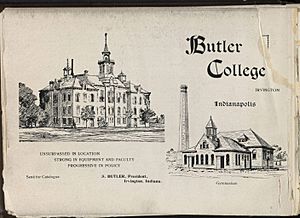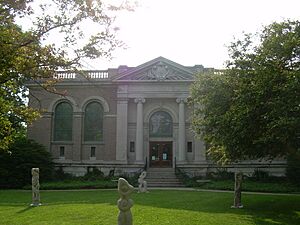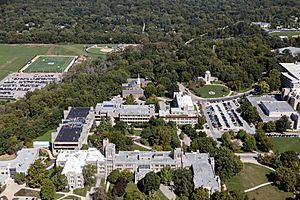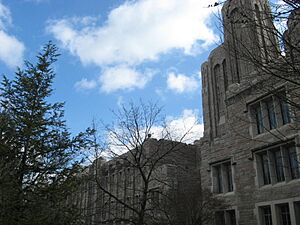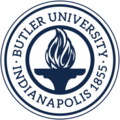Butler University facts for kids
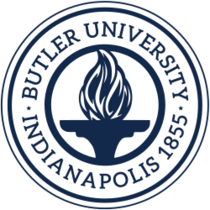 |
|
|
Former names
|
North-Western Christian University (1855–1877) Butler College (1896–1906) |
|---|---|
| Motto | Education, Research, Service |
| Type | Private university |
| Established | November 1, 1855 |
| Accreditation | Higher Learning Commission |
|
Academic affiliations
|
Council of Independent Colleges |
| Endowment | $295.85 million (2024) |
| President | James Danko |
| Provost | Brooke Barnett |
|
Academic staff
|
372 (2024) |
| Students | 5,763 (2024) |
| Undergraduates | 4,519 |
| Postgraduates | 1,244 |
| Location |
,
,
United States
39°50′22″N 86°10′17″W / 39.83944°N 86.17139°W |
| Campus | Urban: 295 acres (119 ha) |
| Colors | Blue and white |
| Nickname | Bulldogs |
|
Sporting affiliations
|
NCAA Division I Big East, Pioneer League (football) |
| Mascot | Butler Blue IV Hink |
 |
|
Butler University is a private university located in Indianapolis, Indiana, United States. It was started in 1855 by Ovid Butler. The university offers over 60 different subjects for students to study. These subjects are spread across six main colleges. About 5,700 students attend Butler University. Its campus is about five miles (8.0 km) north of downtown Indianapolis.
Contents
History of Butler University
Butler University first opened on November 1, 1855. It was originally called North-Western Christian University. The university was founded by Ovid Butler and members of the Christian Church. However, the church never fully controlled the school.
The university was special because it was one of the first in the United States to allow both men and women to attend. It was also the second university in Indiana to do this.
Early Achievements
Butler University was a leader in education. It created the first English literature professorship in Indiana. It also had the first Department of English in the state. In 1869, Ovid Butler honored his daughter, Demia, by creating a special teaching position. This position was for a female professor of English Literature. Catharine Merrill was the first woman to hold this job. She was only the second female university professor in the entire country.
Changing Locations and Names
In 1875, the university moved to a new campus in a community called Irvington. Two years later, in 1877, its name was changed to Butler University. This was done to honor Ovid Butler for his vision and support. Most of the buildings from this campus were taken down in 1939. The Bona Thompson Library is the only original building that still stands.
Over the years, Butler University joined with other schools. In 1930, it merged with the Teachers College of Indianapolis. This created Butler's second college. Later, in 1945, the College of Pharmacy and Health Sciences was formed after another merger. The Jordan College of Fine Arts was added in 1951.
Butler University Campus
After World War I, more students wanted to attend Butler. This meant the university needed a bigger campus. The current campus was built on the site of an old amusement park called Fairview Park. Classes started there in 1928.
Important Buildings
The first building finished on the new campus was Arthur Jordan Memorial Hall in 1928. It has a classic "Collegiate Gothic" style. This style was used for many other buildings on campus. The Hinkle Fieldhouse was also completed in 1928. It was the largest indoor sports building in Indiana for many years.
After World War II, more buildings were constructed. These included the student center, Atherton Union, and dorms like Ross Hall and Schwitzer Hall. The Holcomb Observatory and Planetarium was opened in 1955.
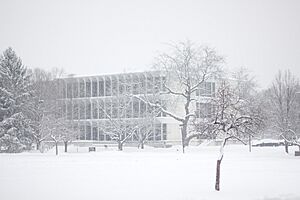
In 1963, the Irwin Library opened. It was designed by a famous architect named Minoru Yamasaki. Also, Clowes Memorial Hall was built around this time. It is a large performance hall. In the 1970s, science buildings like Gallahue Hall and the Holcomb Research Institute were added.
More recently, the Fairbanks Center for Communication and Technology opened in 2001. The Howard L. Schrott Center for the Arts opened in 2013.
What Students Study at Butler
| Forbes | 216 |
|---|---|
Butler University has seven main schools and colleges:
- Andre B. Lacy School of Business
- College of Communication
- College of Education
- College of Liberal Arts and Sciences
- College of Pharmacy and Health Sciences
- Jordan College of the Arts
- Founder's College
Students can choose from over 60 main subjects. There are also 8 pre-professional programs and 19 graduate programs. U.S. News & World Report ranked Butler first among Midwest Regional Universities in 2024. They also said Butler was best in the Midwest for new ideas and undergraduate teaching.
Butler University focuses on helping students learn practical skills. They have small class sizes, so students get lots of individual attention. The university also encourages students and teachers to do research. For example, the Butler Summer Institute helps students do their own research projects with a teacher.
Student Life at Butler
| Race and ethnicity | Total | ||
|---|---|---|---|
| White | 83% |
|
|
| Hispanic | 6% |
|
|
| Black | 4% |
|
|
| Other | 4% |
|
|
| Asian | 3% |
|
|
| Foreign national | 1% |
|
|
| Economic diversity | |||
| Low-income | 14% |
|
|
| Affluent | 86% |
|
|
Students at Butler University can join more than 150 student groups. They can also play in many club and intramural sports. Over 94 percent of students are involved in activities on campus.
Fraternities and Sororities
Many students at Butler join social fraternities or sororities. About 35 percent of undergraduate students are members. The first fraternity at Butler was started in 1859. The first sorority began in 1874. In 1922, the sorority Sigma Gamma Rho was founded at Butler University.
Butler Bulldogs Sports
Butler's sports teams are called the Butler Bulldogs. They compete in Division I of the NCAA. On July 1, 2013, Butler became a founding member of the Big East Conference.
Butler teams have won many conference championships. They have also played in NCAA National Championship Tournaments in sports like basketball, soccer, and volleyball.
Men's Basketball
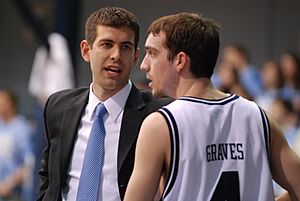
The Butler men's basketball team has been very successful. From 2000 to 2011, they won at least 20 games in most seasons. They also made it to the NCAA tournament many times. Butler won two national championships before the modern tournament began, in 1924 and 1929.
In 2010 and 2011, the Bulldogs made it to the national championship game two years in a row. In 2010, led by player Gordon Hayward, they played in their hometown stadium. They lost a close game to Duke. Butler was the smallest school to play for a national championship since the tournament grew in 1985. In 2011, they reached the championship game again but lost to Connecticut.
Football
The Hoosier Helmet Trophy is a special award for the football game between Butler and Valparaiso University. This trophy was created in 2006 to celebrate the long football rivalry between the two teams. Butler players and their coach, Jeff Voris, came up with the idea.
Famous People from Butler
Alumni
Many people who went to Butler University have become well-known.
Faculty and Staff
Some notable people have also taught or worked at Butler University:
- Allen R. Benton, a former president and professor
- Paul D. "Tony" Hinkle, who helped develop the orange basketball
- Catharine Merrill, one of the first female university professors in the U.S.
- Susan Neville, a creative writing professor
- Brad Stevens, a basketball coach
Images for kids
See also
 In Spanish: Universidad Butler para niños
In Spanish: Universidad Butler para niños
 | Aurelia Browder |
 | Nannie Helen Burroughs |
 | Michelle Alexander |


